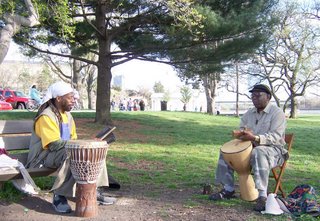Spinning Wool & Playing a Bell

I just returned from a week in Philadelphia, and of course I noticed technology.
Nora spins wool in the Independence Visitor Center, modeling the Colonial way of life. You can see in the photo that I’m transfixed by the spinning wheel (the smaller person not transfixed is Seika, daughter of KnowledgeContext director Trevor Oelschig). All that I know of spinning wheels comes from the movie Gandhi (starring Ben Kingsley), in which spinning cotton on a wheel comes to symbolize Indian independence. For Nora, spinning wool is meditation and connection.
A visitor asked Nora if she got bored spinning for hours. Nora thought that odd: spinning is a way to be at peace for her. I think they spoke past each other because of tacit values. The visitor might evaluate technology on efficiency (I could buy the wool product cheap in a store). Nora evaluated her spinning technology on relationship (Am I mentally present while spinning and do I understand its relationship to my world).
Her wool stock no longer comes from a mill, but from a farm, which she visits to meet the sheep and llamas that grow her wool. Going to source means she must clean the wool of straw and bits of dirt natural to the animals’ world. But it also means that the wool comes pure, without the chemicals used by mills to clean in bulk, something I would think about if Seika were to be exposed to it.
A father walked his large family by the spinning wheel and asked Nora what she was spinning. “Wool.” “But it’s not white,” he protested. “Wool’s not always white.” “Well, I guess you could bleach it,” he concluded. “But why would you want to?” One way or another, we get our chemicals in, usually without the technological literacy to understand even a few of their costs and benefits.
As I knew from Gandhi, spinning cotton takes practice and, at first, the cotton breaks under tension. As I learned from Nora, spinning wool takes practice, but she found it spiritually centering to make different styles of wool yarn, with loft depending on the tension and twist. Nora tore apart the unspun wool to show the fibers to be four or five centimeters in length. Lying alongside each other, those relatively short fibers grip each other strongly enough to stretch out to any length. Unlike hair, which does not readily spin into yarn, wool has both scales, which hook onto other scales, and crimp, which tangles with other fibers (and also makes for greater loft to trap air). Nora pressed the broken ends of wool back together. Magically it healed and she spun it into yarn.

A few days later, I met Donald (on the right) and Kamen (on the left and I’m guessing at the spelling), drumming in Fairmount Park. In the photograph’s background, you can see the Philadelphia Art Museum on the left and the Fairmount Water Works in the middle. Sated with almost six hours in the splendid art museum, I was happy to soak in the primal rhythms. Donald and Kamen were happy to include me. My love for drumming is unaccompanied by any skill, so Kamen asked if I could play the bell. I had not, but I wanted to try. “Just play one-one-one-one. And we’ll fill in the rest.” “How fast,” I asked. “It doesn’t matter, we’ll adapt to you. You are the leader.”
The pressure was on as they played around my metronome. All I could think about was, “Was that last pause shorter than the previous one? I’m sure that was quicker. These guys are good.” At which point, I lost it, and just laughed. “You were listening to Donald, weren’t you?” Kamen scolded me playfully. Yes, Donald’s and Kamen’s driving beats had mesmerized me and I’d stopped listening to my heartbeat or inner rhythm, as Kamen had coached me. “You are the leader. We follow you, so you don’t follow us.” I explained that I felt out of place with two such accomplished drummers. “If you are from this planet then you are in place,” Kamen assured me.
Kamen and Donald spoke of intent, awareness, and consciousness. I told them about Nora and the intent she brings to her spinning wheel. And, when I had to go, I thanked them for so warmly including me in their play. Although I felt awkward keeping a steady beat on the bell, I felt entirely comfortable with Kamen, and Donald…and Nora, whom I saw again just before leaving Philadelphia. When I told her about my drumming experience, she smiled and shook her head: “Synchronicity! I just started learning African drumming. Sometimes angels come into your life.” I’m no angel, but I am glad that I could find warm and thoughtful people in a city new to me, and tell them about each other.

